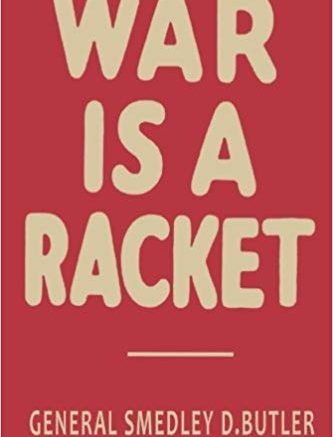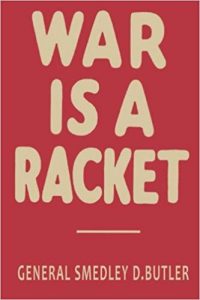Why no retired generals oppose America’s modern forever wars.
By Danny Sjursen
Common Dreams (2/20/20)
There once lived an odd little man—five feet nine inches tall and barely 140 pounds sopping wet—who rocked the lecture circuit and the nation itself. For all but a few activist insiders and scholars, U.S. Marine Corps Major General Smedley Darlington Butler is now lost to history. Yet more than a century ago, this strange contradiction of a man would become a national war hero, celebrated in pulp adventure novels, and then, 30 years later, as one of this country’s most prominent antiwar and anti-imperialist dissidents.
Raised in West Chester, Pennsylvania, and educated in Quaker (pacifist) schools, the son of an influential congressman, he would end up serving in nearly all of America’s “Banana Wars” from 1898 to 1931. Wounded in combat and a rare recipient of two Congressional Medals of Honor, he would retire as the youngest, most decorated major general in the Marines.
A teenage officer and a certified hero during an international intervention in the Chinese Boxer Rebellion of 1900, he would later become a constabulary leader of the Haitian gendarme, the police chief of Philadelphia (while on an approved absence from the military), and a proponent of Marine Corps football. In more standard fashion, he would serve in battle as well as in what might today be labeled peacekeeping, counterinsurgency, and advise-and-assist missions in Cuba, China, the Philippines, Panama, Nicaragua, Mexico, Haiti, France, and China (again). While he showed early signs of skepticism about some of those imperial campaigns or, as they were sardonically called by critics at the time, “Dollar Diplomacy” operations—that is, military campaigns waged on behalf of U.S. corporate business interests—until he retired he remained the prototypical loyal Marine.
He saw clearly that the conflicts he had fought in, the elections he had helped rig, the coups he had supported, and the constabularies he had formed and empowered in faraway lands had all served the interests of U.S. corporate investors.
But after retirement, Smedley Butler changed his tune. He began to blast the imperialist foreign policy and interventionist bullying in which he’d only recently played such a prominent part. Eventually, in 1935 during the Great Depression, in what became a classic passage in his memoir, which he titled “War Is a Racket,” he wrote: “I spent thirty-three years and four months in active military service… And during that period, I spent most of my time being a high class muscle-man for Big Business, for Wall Street, and for the Bankers.”
Seemingly overnight, the famous war hero transformed himself into an equally acclaimed antiwar speaker and activist in a politically turbulent era. Those were, admittedly, uncommonly anti-interventionist years, in which veterans and politicians alike promoted what (for America, at least) had been fringe ideas. This was, after all, the height of what later pro-war interventionists would pejoratively label American “isolationism.”
Unapologetic amenability to left-wing domestic politics and materialist critiques
Nonetheless, Butler was unique (for that moment and certainly for our own) in his unapologetic amenability to left-wing domestic politics and materialist critiques of American militarism. In the last years of his life, he would face increasing criticism from his former admirer, President Franklin D. Roosevelt, the military establishment, and the interventionist press. This was particularly true after Adolf Hitler’s Nazi Germany invaded Poland and later France. Given the severity of the Nazi threat to mankind, hindsight undoubtedly proved Butler’s virulent opposition to U.S. intervention in World War II wrong.
Nevertheless, the long-term erasure of his decade of antiwar and anti-imperialist activism and the assumption that all his assertions were irrelevant has proven historically deeply misguided. In the wake of America’s brief but bloody entry into the First World War, the skepticism of Butler (and a significant part of an entire generation of veterans) about intervention in a new European bloodbath should have been understandable. Above all, however, his critique of American militarism of an earlier imperial era in the Pacific and in Latin America remains prescient and all too timely today, especially coming as it did from one of the most decorated and high-ranking general officers of his time. (In the era of the never-ending war on terror, such a phenomenon is quite literally inconceivable.)
Smedley Butler’s Marine Corps and the military of his day was, in certain ways, a different sort of organization than today’s highly professionalized armed forces. History rarely repeats itself, not in a literal sense anyway. Still, there are some disturbing similarities between the careers of Butler and today’s generation of forever-war fighters. All of them served repeated tours of duty in (mostly) unsanctioned wars around the world. Butler’s conflicts may have stretched west from Haiti across the oceans to China, whereas today’s generals mostly lead missions from West Africa east to Central Asia, but both sets of conflicts seemed perpetual in their day and were motivated by barely concealed economic and imperial interests.
Silence in the face hyper-interventionism
Nonetheless, whereas this country’s imperial campaigns of the first third of the twentieth century generated a Smedley Butler, the hyper-interventionism of the first decades of this century hasn’t produced a single even faintly comparable figure. Not one. Zero. Zilch. Why that is matters and illustrates much about the U.S. military establishment and contemporary national culture, none of it particularly encouraging. …


